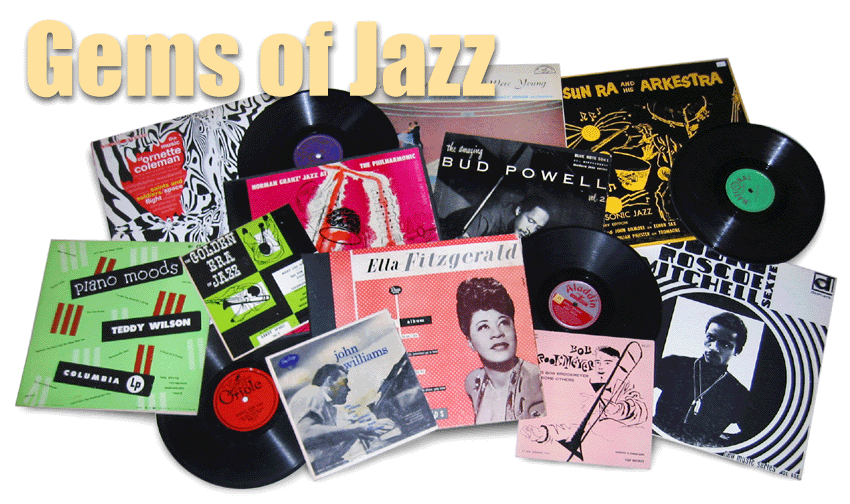If you tootle around eBay like I do occasionally (well, more than occasionally), and you look for jazz LPs, you've probably seen the record below offered for big money. Why? In a word, cheesecake. Collectors of genteel erotica pony up real dough for albums with over-exposed attractive young women on them. The cover of this Dawn LP is particularly sought after for that reason.
Music? Who cares about the music?
Well, I do (he said self-righteously). And so do you. So that's why I'm posting this album – because it's hard to find, and the music on it is excellent. Not that the comely Vespa jockey isn't an added attraction. But rare sides by Gene Roland and the ultra-obscure Hal Serra are the main reason we (meaning me) here at Gems do what we do.
A funny story about this record. I found it years ago at a church white elephant sale in Connecticut (when I was briefly living there) and listened to it a few times before sticking it in the stacks and forgetting it. Zoom ahead a dozen years to the mid-'90s, and I'm doing my radio show at our newly launched NPR-affiliate, WJFF. I'd pulled "Jazzville, Vol. 4" as part of the afternoon's offerings, and was getting set up for the show when I noticed the name "Dudley Watson" in the album's liner notes. Dudley was the bass player on several of the Gene Roland pieces on the record.
 |
| The remarkable Dudley Watson, performing on WJFF's "Live from Studio B" in the winter of 1994. Photo by Able Rae |
Yeah, that's right. For about 10 years, I also co-hosted a live-jazz program called "Live from Studio B" on WJFF immediately after my record show. Every week we'd have a different group of local jazz players come by and play for an hour. That week's group included Dudley on bass. Talk about serendipity.
Dudley was an extraordinary character. A true jazz gentleman, he was from the old school, a hipster from the days of Bird and Diz. He'd been playing bass for some 50 years when I knew him, and he'd never missed a beat. He was always attired in a sport coat and tie, and invariably wore a short-brimmed fedora. Being an albino, he had to be careful of the sun and had weak eyes made huge by exceedingly thick glasses. Even so, he managed to get around with the agility of a man half his age – all the while lugging his big double bass.
So ... on the day I brought "Jazzville, Vol. 4" in to play on my show, we had Dudley Watson both on wax and live in the studio. A real treat!
These Roland tunes and those by Hal Serra are also a real treat. Serra was originally from Massachusetts' capitol city, though he'd been a New Yorker for many years. His credits include stints arranging with June Christy and Ella Fitzgerald, but he remains largely unknown to most listeners today. He unfortunately passed away about six months ago but, as you'll hear on this download, he's a fine pianist and someone well worth seeking out.
The same can be said of Gene Roland, though his music has always been a bit more in the public eye. These arrangements are real swingers, as are the tunes. It's interesting to hear Paul Quinichette outside of the usual Basie-esque setting, too.
A word about the sound quality. I have a dozen vintage Dawn LPs and, though each looks absolutely pristine to the eye, each invariably plays with a fair degree of surface noise. No degree of washing seems to help (as it often does with most noisy LPs). So be forewarned – there is a good deal of hiss in places on this record, especially in the last few Serra numbers. No pops or clicks, just "sssssss." The music, though, is well worth hearing despite the somewhat defective sound.


Jazzville, Vol. 4
Gene Roland/Hal Serra
Dawn DLP 1122
Gene Roland, comp, arr, tp; Johnny Carisi, tp; Dick Meldonian, as; Paul Quinichette, ts; Robbie Swope, tbn; Nat Pierce, p; Dudley Watson, b; Walter Nolan, d.
August 20, 1959, New York, NY.
1. Suitcase
2. Minor Scene
Gene Roland, comp, arr, tp; Paul Quinichette, ts; Nat Pierce, p; Freddie Green, g; Wendall Marshall, b; Sonny Payne, d.
August 26, 1957, New York, NY.
3. Colonel Hodge
Gene Roland, arr, tp; Paul Quinichette, ts; Nat Pierce, p; Doyle Salathiel, g; Oscar Pettiford, b; Osie Johnson, d.
August 13, 1957, New York, NY.
4. The Creeper (Pettiford)
Hal Serra, p; Bert Collins, tp (2, 4); Ernie Furtado, b (5, 9); Earl May, b (6, 8); Joe Williams, b (7); John Cresci, d (5, 7, 9); Ed Thigpen, d (6, 8)
1958, New York, NY.
5. Everything I've Got Belongs to You
6. Why Was I Born
7. Irma (Serra)
8. Suddenly It's Spring
9. The Things I Love
Find it here: http://www.mediafire.com/?oocbdqozx1e1i4w








